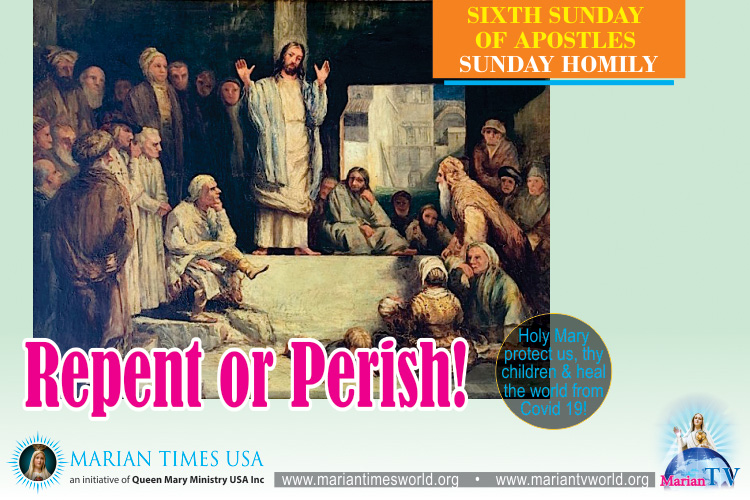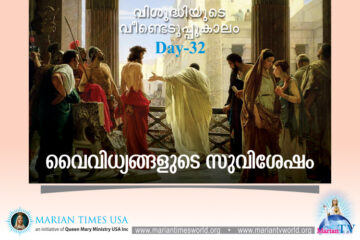REPENT OR PERISH! (SUNDAY HOMILY)


Fr. Abraham Mutholath,
Chicago, USA.
SIXTH SUNDAY OF APOSTLES
INTRODUCTION
“Repentance” and “Perish” are the two key words in this gospel passage. Because of the fall of the first parents, all are born in sin and are under the influence of the evil. Jesus declared that it was time for people to repent and reconcile with God through himso that they escape final destruction. Showing two tragedies as examples that happened in Jerusalem for some Galileans and 18 inhabitants of Jerusalem during Jesus’ public ministry, he said that all who reject the redeemer and his message would perish in a similar manner.Jesus predicted two destructions: the destruction of the Temple of Jerusalem that happened in 70 A.D. and the destruction of the evil doers at his second coming to judge the righteous for eternal reward. Though baptized, we need repentance and constant spiritual renewal as we await the second coming of Christ.
The Bible Text
Luke 12:57-13:5
Settlement with an Opponent.
(12:57) “Why do you not judge for yourselves what is right? (58) If you are to go with your opponent before a magistrate, make an effort to settle the matter on the way; otherwise your opponent will turn you over to the judge, and the judge hand you over to the constable, and the constable throw you into prison. (59) I say to you, you will not be released until you have paid the last penny.”
A Call to Repentance.
(13:1) At that time some people who were present there told him about the Galileans whose blood Pilate had mingled with the blood of their sacrifices. (2) He said to them in reply, “Do you think that because these Galileans suffered in this way they were greater sinners than all other Galileans? (3) By no means! But I tell you, if you do not repent, you will all perish as they did! (4) Or those eighteen people who were killed when the tower at Siloam fell on them—do you think they were more guilty than everyone else who lived in Jerusalem? (5) By no means! But I tell you, if you do not repent, you will all perish as they did!”
Interpretation
Background of the gospel passage
Jesus was talking about the signs of the times. He acknowledged how good the people were in interpreting the arrival of rainfrom the rising cloud in the west and the coming of heat based on the wind blowing from the south. He then asked, “You hypocrites! You know how to interpret the appearance of the earth and the sky; why do you not know how to interpret the present time?”(Luke 12:56). “The present time” for Jesus was the Messianic time of “repentance and believe in the gospel” for which John the Baptist prepared the Jews.
Settlement with an Opponent.
(12:57) “Why do you not judge for yourselves what is right?
The implied understanding was that the listeners of Jesus knew what was right but they were not willing to act on it. They knew that Jesus came as the Redeemer. However, they purposefully denied it because of their selfishness and unwillingness to make changes in their lives.
(58) If you are to go with your opponent before a magistrate, make an effort to settle the matter on the way; otherwise your opponent will turn you over to the judge, and the judge hand you over to the constable, and the constable throw you into prison.
Jesus, as usual, told a parable from ordinary life to illustrate the need of reconciliation with God on time to avoid punishment. The implication of the parable is that the one who went with the opponent was the culprit. He was going to be punished, unless he got reconciled on the way. The opponent is the righteous person and represented by Jesus. Jesus might seem like an opponent to the selfish and sinful people. They need to reconcile with the Messiah before they reach God, the judge. Time was running out for reconciliation. This is applicable to us who are also nearing death and approaching God for our judgment.
(59) “I say to you, you will not be released until you have paid the last penny.”
This parable is a biblical proof for the existence of purgatory. In the parable, the accused person is not in prison for lifelong but until he paid the last penny, the least valuable coin. Most humans are gray, and not black or white in their spiritual status. Though sins are forgiven or absolved through sacraments, especially sacrament of reconciliation and anointing of the sick, the stains of sins are to be cleansed and compensations are to be made.
A Call to Repentance.
Unlike usage of parables, Jesus here made use of two tragic accidents that happened. The victims could be innocent people and the tragic death could not be considered as divine punishment. However, such tragic death or calamity will happen later for those who do not keep up the commandments of the Lord.
(13:1) At that time some people who were present there told him about the Galileans whose blood Pilate had mingled with the blood of their sacrifices.
The imminent punishment that Jesus mentioned had double meaning. Revolution was evolving among the Jews against Roman rule. There were groups like Zealots that organized such revolts. According to the Holy Scripture, the Israelites suffered attacks and slavery from enemies because of their disloyalty to the covenant they and their ancestors had made with God. When they committed sin, God withdrew his protection and they became preys to their enemies. When they repent and turn to God with humble heart for help, God raised leaders from them and saved themfrom their strong enemies. So, concern of Jesus was not the Roman rule but the need of conversion of the Jews that would lead to their spiritual and political liberation. Jesus had predicted the destruction of Jerusalem along with its Temple because of their denial of him as the Messiah. The destruction of the Temple and death of many Jews happened in 70 A.D.,40 years after the prediction of Jesus. Besides this political destruction, those who do not follow Jesus would also face spiritual damnation in the future.
When Jesus mentioned about the need of reconciliation before the possible punishment, some people from the audience brought to the attention of Jesus a tragic massacre of some Galileans in Jerusalem. There is no other historical documentation of this event though similar slaughters had happened from the part of Pilate during religious gatherings. For example, Josephus had reported that Pilate had killed some Samaritans while they were worshipping on Mount Gerizim (Antiquities 18:86-87). On another occasion, Pilate had killed many Jews who opposed him for using the Temple money for the reconstruction of an aqueduct in Jerusalem (Jewish War 2:175–77; Antiquities 18:60–62).
Probably a group of pilgrims from Galilee who came to worship in the Temple of Jerusalem were revolutionaries against Roman rule. Pilate’s soldiers might have killed them and thus their blood might have mixed with the blood of the Passover lambs. This might have been the cause of enmity between the Herod Antipas, the tetrarch of Galilee and Pontius Pilate the Roman governor of Judea.
Those who presented the incident of the massacre of the Galileans in the Temple of Jerusalem brought that up to agree with Jesus that opposition with Rome could bring severe punishment or disaster for the offenders. Jesus added a spiritual application to it in his message that followed.
(2) He said to them in reply, “Do you think that because these Galileans suffered in this way they were greater sinners than all other Galileans? (3) By no means! But I tell you, if you do not repent, you will all perish as they did!
Jesus while agreeing with those presented the tragic death of Galileans in Jerusalem, questioned whether they were greater sinners than all others in Galilee. Jesus said similar tragedy could happen to all if they do not repent. It happened in 70 A.D. when the Roman army under the leadership of Titus attacked Jerusalem as a reaction to the revolts against Rome. According to the historian Josephus, 1.1 million people were killed and 97,000 were taken as slaves to Rome. Many fled to areas around Mediterranean Sea. It was believed as wrath of God against Jews and Titus was only an instrument for the punishment.
(4) Or those eighteen people who were killed when the tower at Siloam fell on them—do you think they were more guilty than everyone else who lived in Jerusalem?
This also is another tragedy not recorded elsewhere. The tower might be one that was under construction to support the aqueduct for the pool of Siloam in Jerusalem. Tragedy happened not only to Galileans but also to people in Jerusalem, the holy city. Since Pilate used the offering money of the Temple, some people considered it as a judgement from God for the sacrilege and victims were punished for accepting the Temple offering.
The Jewish people of the time tended to judge the victims as sinners and misfortunes as punishments from God for their sins. According to Jesus, the 18 people who were killed were notgreatersinners than all the others. Jesus used this accident also to clarify that the tragedy or misfortune in this world is not in proportion to the sins of the victims or not to be considered as punishments because such disasters can happen even to the innocent.
(5) By no means! But I tell you, if you do not repent, you will all perish as they did!”
The prophecy of the destruction of the unrepentant happened within 40 years. The Christians who believed in Jesus were saved from the attack of Romans. They fled from Jerusalem either because of persecution from Jews or because they believed in the words of Jesus about the imminent destruction of Jerusalem and had fled when they saw the sign of Roman attack. “Now those who had been scattered by the persecution that arose because of Stephen went as far as Phoenicia, Cyprus, and Antioch, preaching the word to no one but Jews.” (Acts 11:19). According to the early Christian historians Eusebius and Epiphanius, the Christians in Jerusalem escaped to Pella, a Decapolis city prior to the destruction of Jerusalem by the Romans in 70 A.D.
Biblical Meaning of Repentance
Repentance is a prevalent theme in the old and new testament. Whenever Israelites broke away from God, God sent prophets asking them to repent and reconcile with God. The message of John the Baptist who came to prepare the way for the Lord was also repentance. The baptisms he administered were official signs of accepting repentance. Jesus and his disciples also called people to repent.
Jesus presented repentance in the vivid parable of the Prodigal Son (Luke 15:11-32). The son had deviated from his father by his own mistake. He came back to his senses and returned and reconciled with the Father. However, the Father was generous to accept him as his son with full rights which was more than the expectation of the prodigal son. In the parable, repentance presumes sin, that is deviation from the intimate relationship with God by our own fault. Our reviewing of faults, feeling of regret for the wrong actions, a resolution to change our behavior, and meeting God through baptism and later through the sacrament of reconciliation are necessary.
The Greekword for repentance is Metanoia. It implies a change of mind and change of conduct. The prodigal son was supposed to change his behavior and relation with his father. Jesus said to the adulterous woman who was brought to be stoned, “Neither do I condemn you; go, and from now on sin no more.” (John 8:11-13).Repentance and reconciliation become complete only with the grace of God’s acceptance of our repentance and our willingness to change our sinful life.
Biblical meaning of perish
The influence of Satan, sin, disease, and death came into the world because of the fall of the first parents. Jesus had spiritually redeemed us. However, if we voluntarily reject his salvation, we will perish for eternity. “For God so loved the world, that he gave his only begotten Son, that whosoever believeth in him should not perish, but have everlasting life” (John 3:16). The Greek word for perish is “apollumi” which means “to lose.” We are already lost by the original sin. Only Jesus can redeem us through his redemptive action.
The expulsion of first parents from paradise was a temporary removal with the promise of retrieval through a savior. That is why Jesus came in search of the lost sheep (Mathew 15:24). Just like the fall of the first parents was a free-will decision, our acceptance of salvation through repentance also is a free-will choice we have to make. If we opt not, we are losing our chance for rescue and willfully accepting our final and everlasting destruction. So our destruction is not from God but by our own selection.
Here are some examples of choice in favor of saving or perishing: Careless parents might be destroying the life of a child. A lazy student might be opting for a less quality adult life. A patient who denies taking medication or required surgery for terminal illness is accepting his own termination of life. A driver disregarding the traffic signal can lead to accident and even death. In each of these examples, there is an external support to guide for better life. Jesus is that guide and final rescuer for regaining our sonship with God.
Message
- Jesus’ call for repentance is applicable for both non-Christians and Christians. Even after baptism we are prone to commit sin. We need to use the sacrament of reconciliation for our spiritual cleanliness.
- Repentance cannot be prolonged because we are not sure whether we would get a chance later. Every day we reach closer to the end of life.
- We are like a person floating in a river that would soon become a waterfall. Jesus sends his church or sacrament of reconciliation as a lifeboat to rescue us. If we fail to make use of it, we might soon face the waterfall and death.
- Reward and punishment are assured at the time of final judgement based on our acceptance or rejection of the Word of God.
- Along with repentance, compensation for sins committed is required to get deliverance from the imminent punishment.
- Repentance is not just expressing our sorrow for sins. It also requires a change of mind and lifestyle like what the prodigal son, St. Paul, or St. Augustine did so that we compensate for failures by loving God and caring for His people.
മരിയന് ടൈംസിലെ ഇന്നത്തെ പ്രധാനപ്പെട്ട അപ്ഡേറ്റുകള് താഴെ ലഭിക്കുന്നതാണ്.









